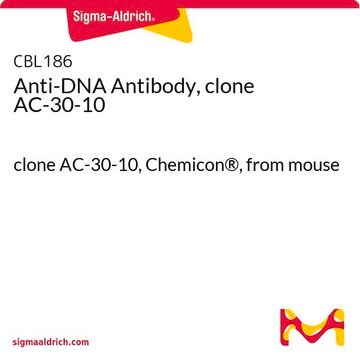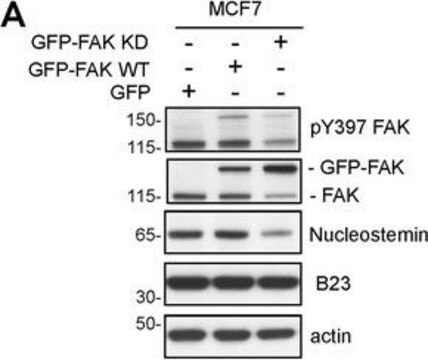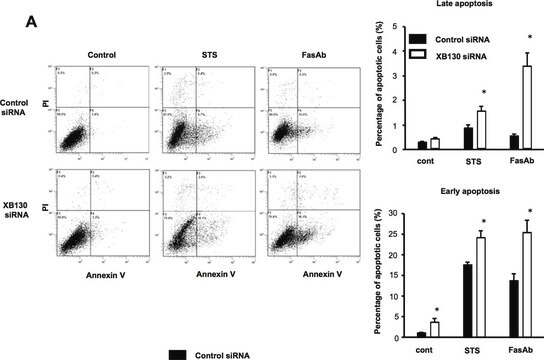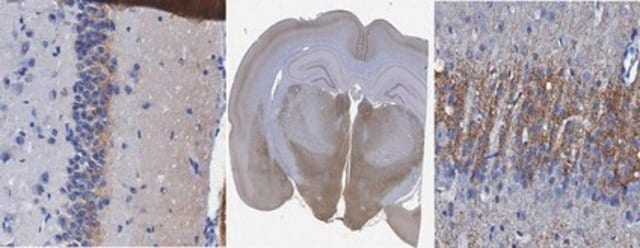추천 제품
생물학적 소스
mouse
항체 형태
culture supernatant
항체 생산 유형
primary antibodies
클론
rJ2, monoclonal
종 반응성
virus
포장
antibody small pack of 25 μL
기술
immunocytochemistry: suitable
immunofluorescence: suitable
동형
IgG2aκ
타겟 번역 후 변형
unmodified
일반 설명
Double-stranded RNA (dsRNA) is a viral product that induces innate immunity, leading to the production of interferon (IFN) alpha and beta, which can lead to the activation of hundreds of IFN-stimulated genes that confer resistance to viruses. dsRNA of more than 30-bp length are reported to be is a key activator of the innate immune response against viral infections. dsRNA is produced by positive-strand RNA viruses, dsRNA viruses, and DNA viruses. However, negative-strand RNA viruses are not shown to generate any significant dsRNA signals. The interaction of the host cell with dsRNA can occur in several ways. Mainly, specific receptors activate the synthesis of IFN alpha and beta, antiviral proteins, and dsRNA-activated enzymes that can block viral replication. dsRNA replication is shown to occur in the cytoplasm for all dsRNA viruses. This dsRNA-specific mouse monoclonal antibody specifically recognizes dsRNA of more than 40-bp length. Clone rJ2 has been used to detect dsRNA intermediates of multiple types of viruses, including Hepatitis C virus, Dengue virus, rhinovirus, Chikungunya virus, Rabies virus, and Polio virus in biological samples. It can be useful in understanding how anti-viral responses are initiated and what how viruses overcome and avoid these antiviral therapies.
특이성
Clone rJ2 specifically recognizes double stranded RNA (dsRNA) of greater than 40 bp in length that is generated during the replication of positive sense genome viruses.
면역원
Double stranded RNA produced by positive sense genome viruses.
애플리케이션
Anti-dsRNA, clone rJ2, Cat. No. MABE1134, is a mouse monoclonal antibody that detects double stranded RNA (dsRNA) and has been tested for use in Immunocytochemistry and Immunofluorescence.
Immunofluorescence Analysis: A representative lot detected dsRNA in Immunofluorescent applications (Savidis, G., et. al. (2016). Cell Rep. 15(11):2323-30; Savidis, G., et. al. (2016). Cell Rep. 16(1):232-246).
Research Category
Inflammation & Immunology
Inflammation & Immunology
품질
Evaluated by Immunocytochemistry in Dengue virus infected A549 cells.
Immunocytochemistry Analysis: A 1:60 dilution of this antibody detected dsRNA in Dengue virus infected A549 cells.
Immunocytochemistry Analysis: A 1:60 dilution of this antibody detected dsRNA in Dengue virus infected A549 cells.
물리적 형태
Mouse monoclonal antibody in supernatant without preservatives.
Unpurified
저장 및 안정성
Stable for 1 year at -20°C from date of receipt. Handling Recommendations: Upon receipt and prior to removing the cap, centrifuge the vial and gently mix the solution. Aliquot into microcentrifuge tubes and store at -20°C. Avoid repeated freeze/thaw cycles, which may damage IgG and affect product performance.
기타 정보
Concentration: Please refer to lot specific datasheet.
면책조항
Unless otherwise stated in our catalog or other company documentation accompanying the product(s), our products are intended for research use only and are not to be used for any other purpose, which includes but is not limited to, unauthorized commercial uses, in vitro diagnostic uses, ex vivo or in vivo therapeutic uses or any type of consumption or application to humans or animals.
적합한 제품을 찾을 수 없으신가요?
당사의 제품 선택기 도구.을(를) 시도해 보세요.
Storage Class Code
10 - Combustible liquids
WGK
WGK 3
시험 성적서(COA)
제품의 로트/배치 번호를 입력하여 시험 성적서(COA)을 검색하십시오. 로트 및 배치 번호는 제품 라벨에 있는 ‘로트’ 또는 ‘배치’라는 용어 뒤에서 찾을 수 있습니다.
Kim M Stegmann et al.
iScience, 25(5), 104293-104293 (2022-05-03)
The nucleoside analog N4-hydroxycytidine (NHC) is the active metabolite of the prodrug molnupiravir, which has been approved for the treatment of COVID-19. SARS-CoV-2 incorporates NHC into its RNA, resulting in defective virus genomes. Likewise, inhibitors of dihydroorotate dehydrogenase (DHODH) reduce
Lilian Schimmel et al.
Clinical & translational immunology, 10(10), e1350-e1350 (2021-11-02)
Thrombotic and microvascular complications are frequently seen in deceased COVID-19 patients. However, whether this is caused by direct viral infection of the endothelium or inflammation-induced endothelial activation remains highly contentious. Here, we use patient autopsy samples, primary human endothelial cells
Scotland E Farley et al.
Nature communications, 13(1), 3487-3487 (2022-06-18)
A comprehensive understanding of host dependency factors for SARS-CoV-2 remains elusive. Here, we map alterations in host lipids following SARS-CoV-2 infection using nontargeted lipidomics. We find that SARS-CoV-2 rewires host lipid metabolism, significantly altering hundreds of lipid species to effectively
Tomer M Yaron et al.
bioRxiv : the preprint server for biology (2020-08-21)
While vaccines are vital for preventing COVID-19 infections, it is critical to develop new therapies to treat patients who become infected. Pharmacological targeting of a host factor required for viral replication can suppress viral spread with a low probability of
Amornrat O'Brien et al.
Virology, 556, 73-78 (2021-02-07)
The need to stem the current outbreak of SARS-CoV-2 responsible for COVID-19 is driving the search for inhibitors that will block coronavirus replication and pathogenesis. The coronavirus 3C-like protease (3CLpro) encoded in the replicase polyprotein is an attractive target for
자사의 과학자팀은 생명 과학, 재료 과학, 화학 합성, 크로마토그래피, 분석 및 기타 많은 영역을 포함한 모든 과학 분야에 경험이 있습니다..
고객지원팀으로 연락바랍니다.








